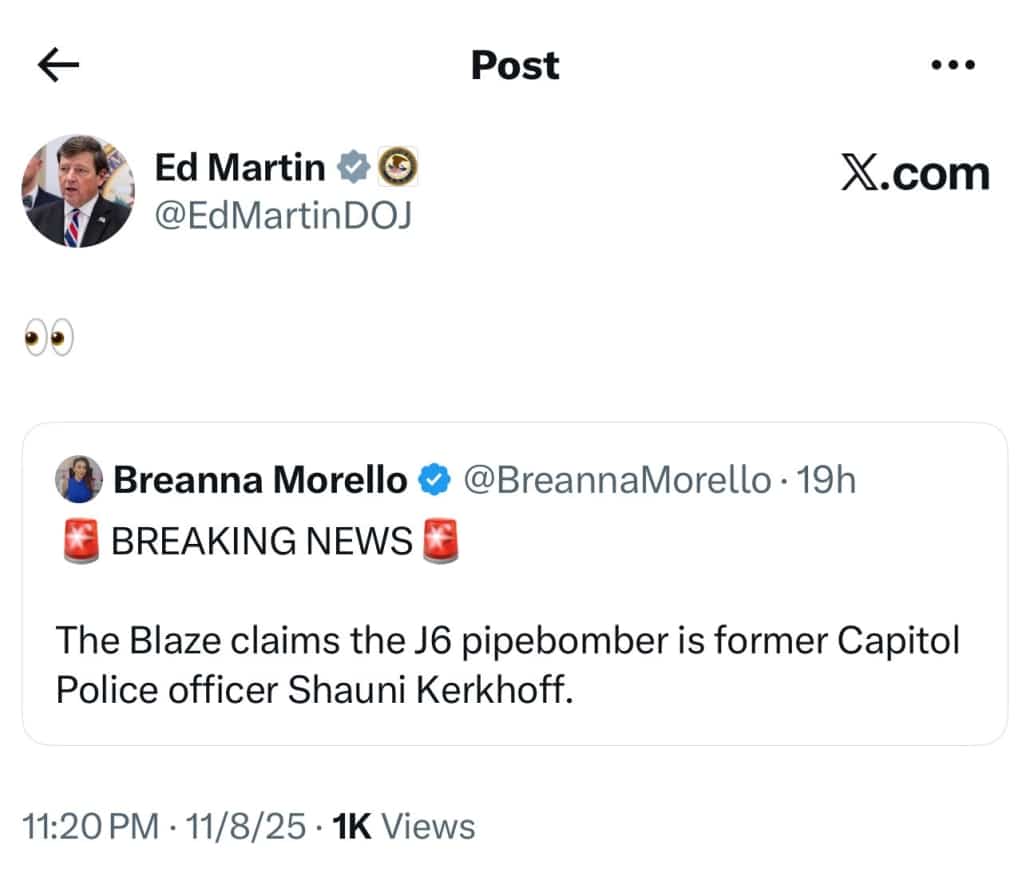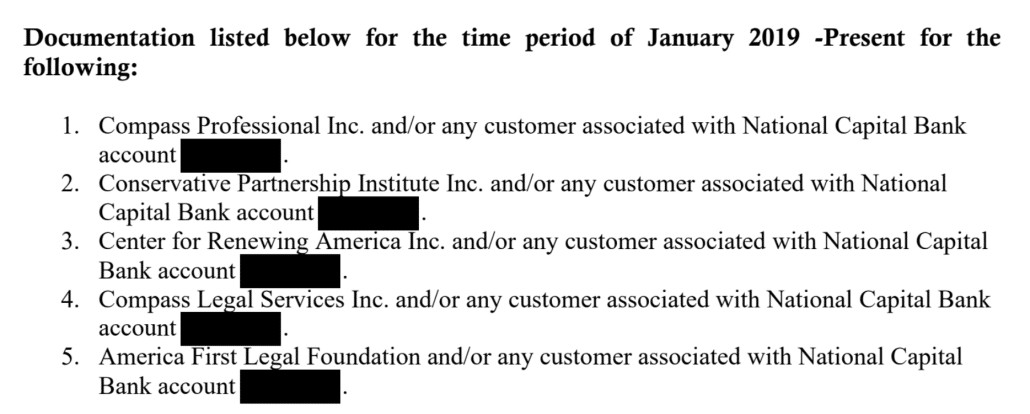Things could get a bit awkward with two of Trump’s terrorists in the days ahead. Trump has done such a great job of memory-holing his insurrection, and yet it won’t entirely go away.
Start with Taylor Taranto. I’ve written about the mentally ill Navy veteran who trespassed on January 6 — just one of thousands of Trumpsters who invaded the Capitol — but then took up with the DC Jail crowd in the aftermath, growing increasingly unstable until when, after Trump posted Barack Obama’s address on Truth Social, Taranto started stalking Obama, as prosecutors described in a footnote of a motion to gag Trump this way:
[T]he defendant’s public targeting of perceived adversaries has resulted in threats, harassment, or intimidation. The public record is replete with other examples. See, e.g., United States v. Taranto, No. 1:23-cr-229, ECF No. 27 at 4-6 (D.D.C. Sep. 12, 2023) (affirming detention order for Taranto and explaining that, after “‘former President Trump posted what he claimed was the address of Former President Barack Obama’ on Truth Social,” Taranto— who had previously entered the Capitol on January 6, 2021—reposted the address, along with a separate post stating, “‘See you in hell, Podesta’s and Obama’s’” [sic], and then proceeded, heavily armed, to the area the defendant had identified as President Obama’s address, while livestreaming himself talking about “getting a ‘shot’ and an ‘angle,’” adding, “‘See, First Amendment, just say First Amendment, free speech’”) (quoting Taranto, ECF No. 20).
Like everyone else, Taranto was pardoned for his Jan6 trespass and his gun-related crimes were downgraded along with the rest of America’s defense against gun crimes. Trump appointee Carl Nichols sentenced him to time served on October 30, but not before Jeanine Pirro’s office tried to hide the sentencing memo (and prosecutors) who described Taranto’s role in Trump’s insurrection and Trump’s role in inciting Taranto’s stalking.
So he was free to go home to Seattle and attempt to rebuild his life from the chaos that Trump made of it.
Only he didn’t.
In recent days he has been back stalking DC, and specifically Jamie Raskin. The very same prosecutors who attempted to bury Trump’s role in inspiring Taranto’s crimes were stuck asking he be jailed again.
Assistant U.S. Attorney Travis Wolf said Taranto’s return to D.C., his erratic behavior and renewed livestreaming raised serious alarms that he was “on the path” to the same conduct that led to criminal charges against him two years earlier and urged that he be returned to jail.
Wolf described acute mental health concerns, a series of alleged violations of Taranto’s supervised release conditions, and alarming social media posts, including one from the parking lot of the Pentagon. The prosecutor discussed other details of Taranto’s case during a closed court session.
Trump appointee Carl Nichols tried to give Taranto one more chance to go back to Washington and get some help. But he continues to lurk around DC, figuring he still has time before he has to report to Probation in Washington on Wednesday.
The man needs help, and jail is not going to get him what he needs, but until he leaves DC, he remains a real concern.
He’s a reminder of what Trump does to people, driving around DC broadcasting as he goes.
According to the standards DOJ has used with ICE protestors, Trump should have been charged right along with Taranto.
Then there’s the possibility that efforts to prosecute alleged pipe bomber Brian Cole will backfire, at least on those — Pam Bondi, Kash Patel, and Dan Bongino — who crowed about the arrest on Thursday.
Since he was arrested there have been a series of leaks, starting with Ryan Reilly (who literally wrote the book on the January 6 investigation, with all that suggests about his possible sources) followed by Evan Perez (one of the best-sourced journalists at FBI), told the FBI he believed Donald Trump’s bullshit.
The man charged with planting two pipe bombs near the Democratic and Republican party headquarters on the eve of the Jan. 6 attack on the U.S. Capitol told the FBI he believed conspiracy theories about the 2020 election, according to two people familiar with the matter.
Brian Cole Jr., 30, is cooperating with the FBI, NBC News has reported, citing a separate person familiar with the matter. Cole appeared in court Friday, one day after he was charged with leaving pipe bombs outside the Republican National Committee and Democratic National Committee in the hours before Donald Trump supporters stormed the U.S. Capitol. Trump has falsely claimed the 2020 election was “rigged.”
Cole confessed to planting the devices outside the parties’ headquarters in the hours before the Capitol attack, three people familiar with the matter told NBC News. A federal prosecutor said in court on Friday that the suspect spoke with the government for more than four hours, but did not reveal the contents of those discussions.
Pirro has been out trying to disclaim the obvious: that Cole is one of Trump’s terrorists, not the insider threat that people like Dan Bongino and Ed Martin have been claiming since the attack.
Anna Bower tracked Martin’s effort to stoke conspiracy theories about the pipe bomber, including this screen cap.
Kash Patel who has fired people for claiming that Jan6ers were a terrible threat to the country, said that when you do what Cole did, “you attack the very being of our way of life” — and he did so after Pam Bondi hailed his hard work to make the case.
And then Bongino went on Sean Hannity and confessed he was making shit up before.
Hannity, during his interview with his former colleague, gave Bongino an opportunity to criticize prior iterations of the Justice Department and FBI for failing to arrest anyone in the case, and praise his own colleagues for getting the job done. But then he asked Bongino about the FBI deputy director’s own role in promoting conspiracy theories about the bomber during Bongino’s past career as a right-wing commentator.
“You know, I don’t know if you remember this — this is before you became the deputy FBI director,” Hannity said. “You put a post on X right after this happened and you said there’s a massive cover-up because the person that planted those pipe bombs, they don’t want you to know who it is because it’s either a connected anti-Trump insider or an inside job. You said that, you know, long before you were even thought of as deputy FBI director.”
Bongino’s response was astounding. He looked down, as if embarrassed, and replied: “Yeah, that’s why I said to you this investigation’s just begun.” But after hemming and hawing about the confidence he and FBI Director Kash Patel have that they arrested the right person, he got real.
“Listen, I was paid in the past, Sean, for my opinions,” he explained. “That’s clear. And one day, I’ll be back in that space. But that’s not what I’m paid for now. I’m paid to be your deputy director, and we base investigations on facts.”
And when you peruse the possible explanations about why FBI didn’t find Cole before this week (I suspect it’s because FBI had far less evidence against Cole when they arrested him on Thursday than against virtually every other Jan6er; they just got fucking lucky that they got the right guy), they all feed left wing concerns.
Did Steve D’Antuono take steps to distract from Cole back in 2021, as some right wingers are now suggesting? If so, he did that between the time he took insufficient steps to prevent the attack and those times in 2022 when he attempted to kill any investigation of Trump.
Did Chris Wray intentionally stall this investigation? Then what does that say about the rest of the January 6 investigation?
And what if Cole says he qualifies for one or both of the pardons Trump already gave to people, like him, who responded to Trump’s false claims by attacking the Capitol. After all Enrique Tarrio, who was convicted of sedition and adjudged a terrorist at sentencing, was gone from the Capitol a whole day before Cole allegedly placed those bombs, and Tarrio got a full pardon. What is Pardon Attorney Ed Martin going to say to conclude that Cole is somehow different from the hundreds of others, including a good many who brought incendiary devices, who have been running free since January?
It’s still possible Jocelyn Ballantine will manage to bury Cole’s pro-Trump leanings — or at least avoid implicating anyone who worked with Cole to plant the bombs in the precisely perfect place to create a distraction on January 6. Ballantine has played such a role before, and emails that Dan Richman submitted in his bid to get his data back before the FBI can violate his Fourth Amendment rights again suggest she was part of the process that led to that violation in the first place.
But until then, the lesson Dan Bongino just learned could be devastating. When you follow the facts, even the most rabid Trump supporter may discover that Trump’s terrorists are the ones threatening America.



